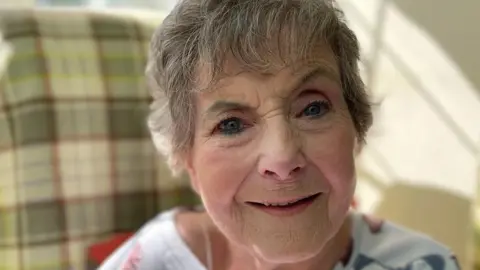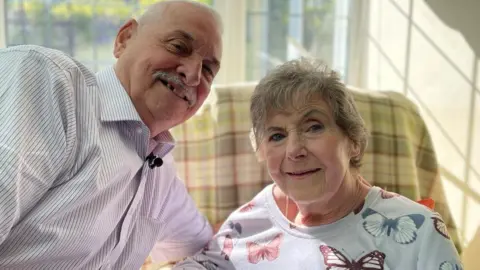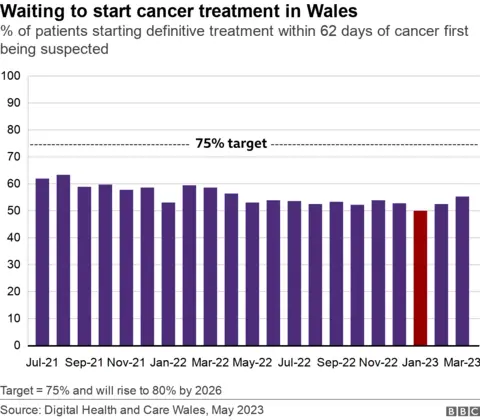NHS Wales waiting times: Thousands still waiting two years
 BBC
BBCAround 30,000 people in Wales are waiting more than two years after being referred for hospital treatment as another key target is missed.
By March, no patient in most specialties was expected to wait that long as the Welsh NHS attempts to tackle its post-Covid backlog.
But official figures showed 31,406 patient pathways had missed the target.
About 576,000 patients are on waiting lists, a rise of 2,000 after a fall in the previous five months.
Waiting times for hospital treatment this month have been adjusted to make them more comparable with England.
But they still make grim reading for the longest waits.
Health Minister Eluned Morgan emphasised that more needs to be done to eliminate the longest waits.
"The day to day work of the NHS is carried out by highly paid executives in the health boards, it is their job to deliver," she told BBC Wales.
"I will take my share of responsibility, and I do every single day of the week in the Senedd. But I think other people need to understand that they have a responsibility also. And what is clear is that some health boards are performing a lot better than others."
The Welsh NHS Confederation, which represents health boards, said reductions were continuing in the longest waits.
"Although the situation is far from ideal, this is the lowest in almost two years and shows just how far the NHS has come and the phenomenal efforts of staff," it said.

Carol and Doug Williams from Glyncoch near Pontypridd, Rhondda Cynon Taf, said they have been waiting three years for Carol's treatment after she fell and fractured her knee.
The couple claim Carol was deemed a "clinical medical emergency" and she would need an operation to repair the damage but the appointment for surgery never came.
In the following months, unsteady on her feet, Carol fell again. This time fracturing a vertebra and her pelvis. This too would need surgery.
But the 79-year-old is still waiting and relies on a frame and wheelchair to get around and is left largely house-bound.
She said: "I feel as if, 'is there going to be an end to it?' I say to the doctor, 'If i could have one day with no pain, I'd cherish it'. But there's nothing."
Doug, a Labour councillor, said he was frustrated in trying to find out where his wife stood on the waiting list and it has affected his own mental health.
"The health board I don't think they appreciate the fact, the impact, one operation has on the family, the relationship. It's tragic".
Health board apologises for waiting times
Orthopaedic cases make up around a third of all the longest waits.
Cwm Taf Morgannwg - along with Cardiff and Vale - have the fewest two year waits for orthopaedic surgery of health boards in Wales.
But it said the effect of the pandemic was still being felt and this had led to longer waiting times than it would wish for:
"We apologise to Mrs Williams, her family, and anyone else in our communities facing increased waiting times for surgery," it said.
It said it would continue to take proactive steps towards decreasing its waiting lists.
Although numbers waiting more than two years in Wales have now been going down every month for the past year, they still make up 4.8% of all those on the list.
There are still 31,406 patient pathways with two-year waits in consultant-led specialisms. This is still way behind England, which has only 559 patients waiting two years or more (0.01% of those waiting this long).
At its peak in England 14 months ago, there were 24,424 patients waiting more than two years, not as high as it is in Wales now.
The Welsh government said if a group of seven "exceptionally challenging" specialities, including orthopaedics, dermatology, general surgery, ophthalmology and ear, nose and throat were excluded as they are "difficult to clear", it leaves 4,300 patients on two-year waiting lists.
The post-pandemic recovery target was set a year ago, although these specialisms not included in it cover 86% of those waiting two years.
The number of people waiting for hospital treatment, after referral, rose after falling for five months in a row.
There were still 734,721 "patient pathways" on the list - this is about 576,000 actual patients, when those who are on more than one waiting list are counted.
When figures are adjusted - to include just consultant-led specialisms and taking out therapy and diagnostics - to make them easier to compare with England, this shows 653,504 pathways.
Those waiting more than a year for treatment continued to fall - by nearly 11,000 over the month - to 133,218 - the lowest number for two years.
Another key post-pandemic NHS Wales recovery target - that no-one should wait more than a year for an outpatient appointment - continues to be missed, although numbers have improved for a seventh month in a row.
There were still 52,925 patients waiting more than a year, a monthly drop of more than 10,000.
Ambulance response times improved on the second-worst figures on record with 53% of immediately life-threatening "red" calls attended to within eight minutes in April.
The average response time to "red" calls was seven minutes 36 seconds - 48 seconds quicker than the previous month.
A&E waiting times have improved slightly over the month.
Against the four-hour target, 70.2% of people were admitted, transferred or discharged within that timeframe.
Meanwhile, 8,949 people spent 12 hours or more in A&E before being seen - no-one should wait that long under current targets, but this is an improvement on the previous month.
Adjusted for population, more patients waited longer than 12 hours in Betsi Cadwaladr than in any other health board.
The Royal College of Emergency Medicine in Wales said: "We are out of winter but remain in crisis."

Cancer performance figures improved for a second successive month after we saw the worst month since the new target was introduced.
A total of 55.3% of people started their first treatment in March within 62 days of cancer being first suspected.
That was as low as 44.5% in Hywel Dda health board.

What has been the response?
The health minister said she had written to health boards to express "disappointment that they have not hit the target for people waiting over two years for treatment".
Ms Morgan added: "I want to see more innovation, like at Ysbyty Gwynedd, where more than 90% of breast cancer surgery is performed as day cases, allowing patients to be managed more efficiently and recover more comfortably and sooner at home."
Welsh Conservatives health spokesman Russell George said: "There are now three times as many people waiting two years in Wales than there are people waiting 18 months in England, despite England having 18 times our population."
Plaid Cymru health spokesman Rhun ap Iorwerth said it showed a "deep-rooted inability to get to grips with the gridlock in our NHS".
British Medical Association Cymru chair Dr Iona Collins said the figures were a "stark reminder of the NHS' failings in Wales" and said it needed staff and resources.

A question has to be asked about the worth of a target that never included the majority of patients.
From the word go "most specialties" did not include areas that even before the pandemic faced real challenges.
Any patient sat at home on one of these lists will be desperate for news - desperate not to be forgotten.
Today they learned they are not even being counted as part of the targets.
But the health minister has set out a new target for health boards - that 99% will be treated by the end of this year.
Perhaps more realistic, yet little comfort to those whose health has declined significantly while waiting.

Enter a postcode to find out what is happening in your area with A&E, ambulances and hospital waiting lists across the UK.
